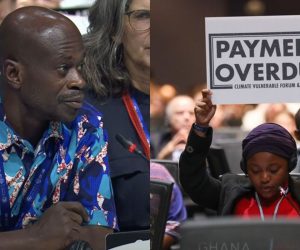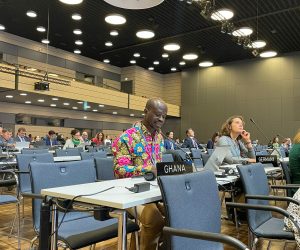
Climate Vulnerable Forum Leaders Dialogue COP26
4:15 – 6:15 pm 2 November 2021 – UNFCCC COP26, Glasgow, Scotland
Intervention of Ms. Saima Wazed
International Focal Point of the Advisory Group on Disability and Disaster Risk Management of the Ministry of Disaster Management of Bangladesh and CVF Thematic Ambassador on Vulnerability
Thank you, your Excellency.
Good evening, ladies and gentlemen, it is a real honor to be here to address the CVS Leaders Dialogue at this forum as the thematic Ambassador for Vulnerability. I want to share two perspectives on vulnerability from my own work and experience in this role and as a professional mental health expert These perspectives are focused on changing the narrative about vulnerability in two specific ways. First, I think it is absolutely vital that we contribute to a shift in understanding of vulnerability as a purely physical concept. Climate change threats are affecting especially vulnerable communities of this world in truly profound ways. People are losing not only their homes, their livelihoods, their ways of life and the loved ones, but they are losing the heritage, the essence of who they are and who their ancestors were. All of this and more goes far beyond the physical damage affecting millions upon millions and affects our psychological and mental wellbeing, our social functioning, our ability to be who we are. In fact, natural calamities have been found to predictably increase the prevalence of mental illness among effected communities in the time following a disaster. Climate change is a growing source of anxiety especially among youth. There is research that shows that 50% of our youth experience anxiety directly as fear and worries over climate change. As we have our youth speaker talk about it, it is a real growing concern for all of us. We know that the global COVID-19 pandemic has been a huge mental health challenge. Likewise, is climate change a huge mental health challenge, a public health concern, not just for our vulnerable countries, but for all countries.
The sooner we wake up to this crisis and address it, the sooner we will realize the full scope of what is at stake and take effective action in order to respond to it. Secondly, I would like to think it is equally vital that we rethink and reframe the concept of victimhood of vulnerability. The CVF countries and the millions of people who live and are affected by climate change are vulnerable, but they are also resilient. Our communities, especially in my country Bangladesh, are handling some of the worst disasters imaginable year after year after year. And it always amazes me the resilience that they demonstrate despite the loss of home, livelihood, and damage. People have been evacuated from their homes, they have been heavily damaged, they may lose a whole year of crops, but once they return, they are able to find their way back. They are able to go grow their crops, work in the communities, and repair their homes. They plant new crops or build new lives when they give in just a very small assistance and a small help, whether that is financial help or social support.
So vulnerability also means they are the most resilient. We in the vulnerable countries, we, people are the most resilient in the world. Our own resilience is important and needs to be recognized. People from vulnerable countries are survivors, they are not victims, they are facing challenges that are overwhelming and yet they are recovering from that. We in the international community need to invest in the vulnerable people and strengthen their resilience. In fact, despite all of our resilience, we continue to face challenges and we are reaching a point where our resiliency is not enough. We are becoming overwhelmed. So imagine in countries where you are seeing the effects of climate change and you see these damages and you have the population that does not have the resiliency, does not have the experience to pick up again where things left off and start rebuilding a life. What do you expect people in those countries to manage to do and to come back and restart their lives?
Many of the people suffer each year due to climate change, they should be assigned caution to the world, there is no country that is safe from the impact of climate change because the impact will be seeking out people everywhere, including populations who have not been used to regular disasters. Our highly resilient populations are becoming overwhelmed and the same overwhelming impacts are the ones that will be on everyone’s doorstep. I hope that these perspectives will store us into action and boost us to help replicate our strengths, help the CVF leaders take this message and the message and experience of our people to the next level. I commend our leaders today and many of the speakers talking about our impact and effective action and showing direction, I especially love the term that we are really the moral compass of the event that we are here for the COP26, because we truly know what it is like, and we can show the way how to do it better.
Thank you so much.



